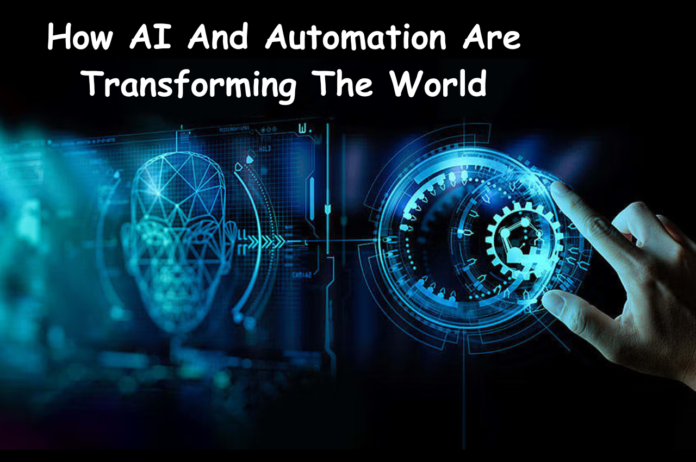AI and automation are reshaping almost every sector of the economy lately. It has revolutionized emerging technologies such as robotics, Internet of Things (IoT), Big Data and generative AI like ChatGPT and AI Art Generator. Statistics show that around 44% of companies are currently interested in seriously investing in AI. In addition, IBM inventors received 2,300 artificial intelligence-related patents in 2021.
Now the question is, how is AI and automation transforming the world? In today’s article we have given importance to this issue. Let’s get started now-
Evolution Of AI
Artificial intelligence has made significant advancements since 1951 when Christopher Strachey developed a checkers program at the University of Manchester. In recent years, AI has progressed rapidly, with applications ranging from sequencing RNA for vaccines to modeling human speech using various algorithms and models.
A recent AI survey conducted by researchers at the Future of Humanity Institute at Oxford University revealed interesting findings. According to the survey, respondents anticipate machines to be capable of writing school essays by 2026, self-driving trucks to replace human drivers by 2027, and surpassing humans in retail positions by 2031. The potential economic impact of AI is substantial, with projections suggesting a global economic gain of up to $15.7 trillion by 2030 through the utilization of artificial intelligence.
How AI And Automation Are Transforming The World
Modern AI, particularly “narrow AI,” has made a significant impact on various industries through data-driven models. According to David Vandegrift, the co-founder and CTO of 4 Degrees, assumptions about the limitations of intelligent software capabilities are misguided. Major corporations such as Google, Amazon, Microsoft, and Apple invest billions in artificial intelligence and automation annually. Universities are incorporating AI into their academic programs, and the U.S. Department of Defense is enhancing its AI initiatives. While some sectors are just beginning to explore AI, others have fully embraced it. However, there is still progress to be made across all industries. Hope this is at least a little clearer about how AI and automation are transforming the world.
AI In Transportation
The advent of autonomous vehicles is inevitable, despite their current imperfections. By spring 2024, autonomous taxis are expected to be operational in Tokyo. On the other hand, Waymo has been working on autonomous vehicles since 2010 and initiated public road testing in 2018. Nevertheless, large-scale production has not commenced yet.
Moreover, the issue of predicting travel delays is crucial. Air travel, in particular, faces significant delays, with UC Berkeley estimating that delays have cost the U.S. $32.9 billion. However, AI is already being utilized to forecast flight delays in advance, as well as delays for cars, buses, and trucks.
AI In Healthcare
The healthcare industry has been transformed by AI, changing the dynamics of human interaction within it. AI has the capability to efficiently and rapidly detect and monitor diseases through the utilization of big data. Through deep learning AI, diseases can be identified at a quicker pace, personalized treatment plans can be devised, and certain tasks such as drug discovery can be automated. This advancement in technology not only enhances healthcare delivery, but also boosts safety measures and decreases overall costs.
AI In Education
AI has transformed the ways in which learning and teaching are conducted, constantly reshaping the learning process for everyone. Through the utilization of automated content, individuals are able to conveniently access information in multiple formats. Machine learning and neural networks have the capability to aid students in their learning journey and identify instances of plagiarism. Presently and moving forward, AI has the potential to customize and enhance the learning experience for each student.
AI In Media
The journalism sector is increasingly incorporating artificial intelligence into its operations, a trend that is expected to continue. One notable example is Automated Insights, a technology developed by The Associated Press, which is responsible for generating thousands of earnings reports. In the past, it would take three to four hours to write a document, but now a skilled individual can review and edit an AI-generated article in just 15 to 20 minutes. Some countries, including China, Japan, India and Kuwait, have introduced AI-generated news anchors that have revolutionized the broadcasting industry. AI is also being utilized to replicate art, although this has sparked concerns regarding issues such as compensation and plagiarism.
Balancing AI With Human Interaction
Artificial intelligence has the potential to revolutionize various industries by being categorized into automation and augmentation. Automation eliminates the need for human labor, while augmentation enhances human intelligence and performance.
In the workplace, people are exploring new ways to leverage AI effectively. However, for AI to truly boost business productivity and efficiency, it must collaborate with humans. For instance, generative AI-written articles still require human editing. An important concern is AI hallucination, where AI tools produce plausible but factually incorrect outputs. A recent CNN report revealed corrections needed for numerous AI-generated stories, some requiring “substantial” edits. This underscores the necessity of human oversight in AI.
Before integrating AI, businesses and individuals must carefully consider the advantages and disadvantages. Despite potential challenges, the possibilities with AI seem endless. Industry leaders are actively assessing how AI impacts their businesses and how they can navigate and address these challenges effectively. From today’s article, we understand how AI and automation are transforming the world.
Technocommy is a connecting space, the leading growth and networking organization for business owners and leaders. Do I qualify?


